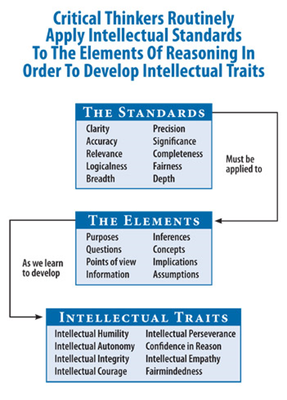Do Your Questions Drive Critical Thinking?

The focus in the Office of HSC Faculty Development is to engage, equip, and inspire faculty and all teachers at the Health Sciences Center in support of the mandate to make UofL a great place to learn. In October 2019, the Faculty Feed published two posts in support of better approaches to questioning learners:
1) Telling is Not Teaching (October 9, 2019), and
2) The Socratic versus Pimping Approach to Questioning (October 16, 2019)
In these posts, we explained why telling (alone) is not teaching and that Socratic questioning is a learner-centric approach that helps the learner develop critical thinking skills, among other benefits. Critical thinking skills are vital to the excellent care of patients since factual knowledge alone (whether in your learners' heads or in Google) is insufficient for evidence-based, well-reasoned patient care decision-making. So let's take this discussion to the next level…just what is critical thinking, and how do we develop that critical skill in our learners?
The Foundation for Critical Thinking defines critical thinking as:
The intellectually disciplined process of actively and skillfully conceptualizing, applying, analyzing, synthesizing, and/or evaluating information gathered from, or generalized by, observation, experience, reflection, reasoning, or communication, as a guide to belief and action. It presupposes assent to rigorous standards of excellence and mindful command of their use. It entails effective communication and problem-solving abilities.

What does critical thinking allow us to do as healthcare providers? Most would agree that it helps us solve clinical problems by exercising effective clinical decision making when facts alone are insufficient to clearly outline what should be done next for a patient. The University of Louisville encourages the use of the Paul-Elder Critical Thinking Framework (Paul & Elder, 2008). So just what is this model, and how can we use it in the education of learners on the Health Sciences Center Campus?
The HSC Office of Faculty Development is interested in how questioning strategies can be applied to enhance critical thinking skills in learners. Let's look at how the intellectual standards in the Paul-Elder model can be used as a guide to creating and asking more effective questions. In the table below are some questions that arise from six of the nine standards.
Figure Retrieved from https://www.dentalcare.com/en-us/professional-education/ce-courses/ce551/the-elements-of-reasoning
Accuracy
| Clarity
|
|---|---|
Breadth
| Depth
|
Significance
| Relevance
|
You get the idea. Our questions directed to learners need to go well beyond those that are satisfied by fact-based answers (usually "what" questions) if we are to stimulate critical thinking in them. The Paul-Elder model posits that the consistent application of the Intellectual Standards of thinking to the Elements of Thinking results in the development of Intellectual Traits like humility, courage, empathy, integrity, etc. as noted in the illustration above. Check out this interactive site from the Foundation for Critical Thinking on the Intellectual Standards.
Want to learn more? In the Strategic Questioning III Module (publication date of February 7, 2020, to the Online Library), you will learn how we are applying Bloom's Taxonomy and questions of elaboration (how, why, and what if questions) into the clinical teaching environment with the expected outcome of better clinical reasoning and critical thinking skills. Together, the Paul-Elder framework for critical thinking and the Strategic Questioning III online module provide a logical strategy for enhancing our HSC campus learners' critical thinking skills and will go a long way to making UofL a great place to learn. Commit to taking a look at the module or plan on attending our faculty development workshop on this approach on March 25, 2020, from 12:00-1:00 pm, Room B 115 in the Medical School Instructional Building (RSVP).
Applying Effective Learning Science to Clinical Teaching in the Moment
Gerard Rabalais, Russ Farmer & Staci Saner
March 25, 12:00-1:00 pm B 115
RSVP:https://grandroundsmarch25.eventbrite.com
References
Paul, R., & Elder, L. (2008). The miniature guide to critical thinking: Concepts and tools. Dillon Beach, CA: Foundation for Critical Thinking.